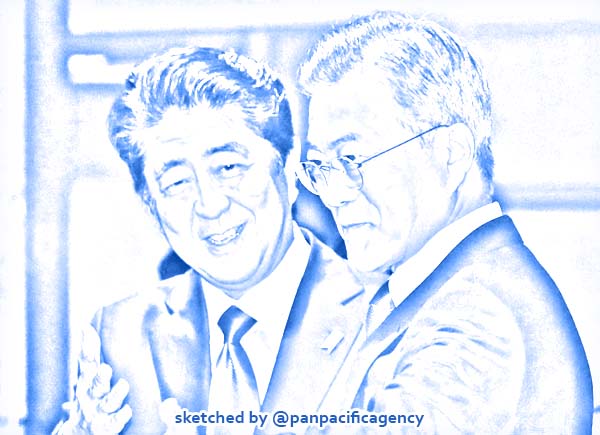[Analytics] Can Japan and South Korea cooperate against pandemic?

South Korea's President Moon Jae-in and Japanese PM Shinzo Abe. Sketched by the Pan Pacific Agency.
In 2019 Japan–ROK relations were their worst since the normalisation of diplomatic relations in 1965. Historical memory haunts the two countries and the wartime forced-labour issue played a significant role in their recent trade dispute. So far, the COVID-19 crisis has not had a big impact on the rigid relationship. But South Korean success and Japanese failure in dealing with COVID-19 might open a tiny window of opportunity to renew cooperation and establish a more trustworthy relationship between the two countries. Kazuhiko Togo specially for the East Asia Forum.
In his speech to commemorate the Korean independence movement on 1 March 2020, ROK President Moon Jae-in made a strong plea to the South Korean people to overcome the COVID-19 crisis. He also mentioned working with Japan to overcome the crisis jointly and ‘establish future-oriented cooperative relations’.
In this speech, Moon’s rebuking of Japan’s 1910 annexation of Korea has been more moderate than his predecessors. In spite of Moon’s approach, Japan has largely failed — across government, opinion leaders and the media — to recognise or appreciate his positive signalling for greater cooperation.
South Korea’s COVID-19 outbreak exploded in mid-February after a mass gathering of a religious organisation and the number of infections spiked rapidly, rising from 30 to 2300 in ten days. The Moon government acted quickly and efficiently to combat the outbreak. It rolled out an effective polymerase chain reaction (PCR) testing system to track the virus. A system was introduced to let hospitals quarantine ‘seriously affected patients’ and to isolate ‘lightly affected patients’ in other institutions.
Japan’s aloofness to President Moon’s call for cooperation could be seen, from a South Korean perspective, as disregarding South Korea’s success in fighting COVID-19.
On 5 March, Japan implemented travel restrictions requiring South Koreans arriving in Japan to undergo a two-week period of quarantine. The following day South Korean Foreign Minister Kang Kyung-wha met the Japanese ambassador in Seoul and protested that the decision ‘was not only unfriendly but unscientific’ and that ‘South Korea will be bound to take reciprocal measures’. She emphasised that there was no prior notice or consultation about the restrictions.
Most Japanese media outlets reported that these new travel restrictions were in line with Japan’s travel ban against China. COVID-19 originally spread from Wuhan and the timing of the travel ban was associated with the decision to postpone Chinese President Xi Jinping’s visit to Japan. Though the number of COVID-19 patients was still rising in South Korea, there was a clear lack of willingness to cooperate on the part of the Japanese government.
It was only on 20 March that a more positive Japanese attitude began to emerge after the foreign ministers of Japan, China and South Korea held a teleconference on COVID-19. Japan’s Ministry of Foreign Affairs published a list of cooperation projects which the three countries are supposed to carry out together. Subsequent Japan–ROK director-general talks on 1 April positively noted the ministerial talks that took place on 20 March.
On 14 April, the ASEAN+3 (Japan, China, South Korea) online summit on COVID-19 took place. The positive tone on issues of international cooperation was preserved in its adopted communique.
But despite these developments, there is little evidence of real and concrete cooperation between Japan and South Korea.
On 15 April, South Korea held an election for its national assembly. The ruling Democratic Party and the Platform Party won 180 seats while the opposition conservative United Future Party and the Future Korea Party secured only 103 seats. The Japanese media overwhelmingly commented that voters supported Moon for his successful fight against COVID-19.
This should provide a strong incentive for the Japanese government to think more seriously and perhaps learn from Moon’s successes.
In late March, Nobel Laureate Professor Shinya Yamanaka — concerned by a lack of government action in Japan — created a simple website to inform the public about COVID-19. Yamanaka suggested a number of actions, including protecting hospitals and other medical care institutions to prevent ‘medical collapse’ and swift PCR testing. These actions represent the essence of the South Korean policy since the middle of February.
On 4 May Japanese Prime Minister Shinzo Abe extended the nationwide state of emergency, now set in place until 31 May. He had first announced a nationwide state of emergency only on 16 April.
On 20 April, the number of COVID-19 cases (10,797) in Japan surpassed those in South Korea (10,674). Since then infections in Japan have risen sharply to 14,623 (470 deaths), while the South Korean figure has long flattened, as of 2 May at 10,780 (250 deaths).
These figures highlight South Korean success and Japanese failure in their respective wars against COVID-19. It is shocking that as late as 16 March, the number of infections in South Korea was 8236, the fourth largest in the world, whereas in Japan the number of infections was only 835.
The Japanese media is anticipating that President Moon’s double victory — against COVID-19 and in the legislative election — will lead him to take a tougher position on the wartime forced-labour issue.
Yet there is an opportunity for cooperation rather than confrontation. If Prime Minister Abe could show more humility in acknowledging Moon’s success and a willingness to learn from his COVID-19 strategy, Moon might cooperate with Abe in real terms to help Japan’s fight against the pandemic.
Kazuhiko Togo is Guest Professor at Kyoto Sangyo University.